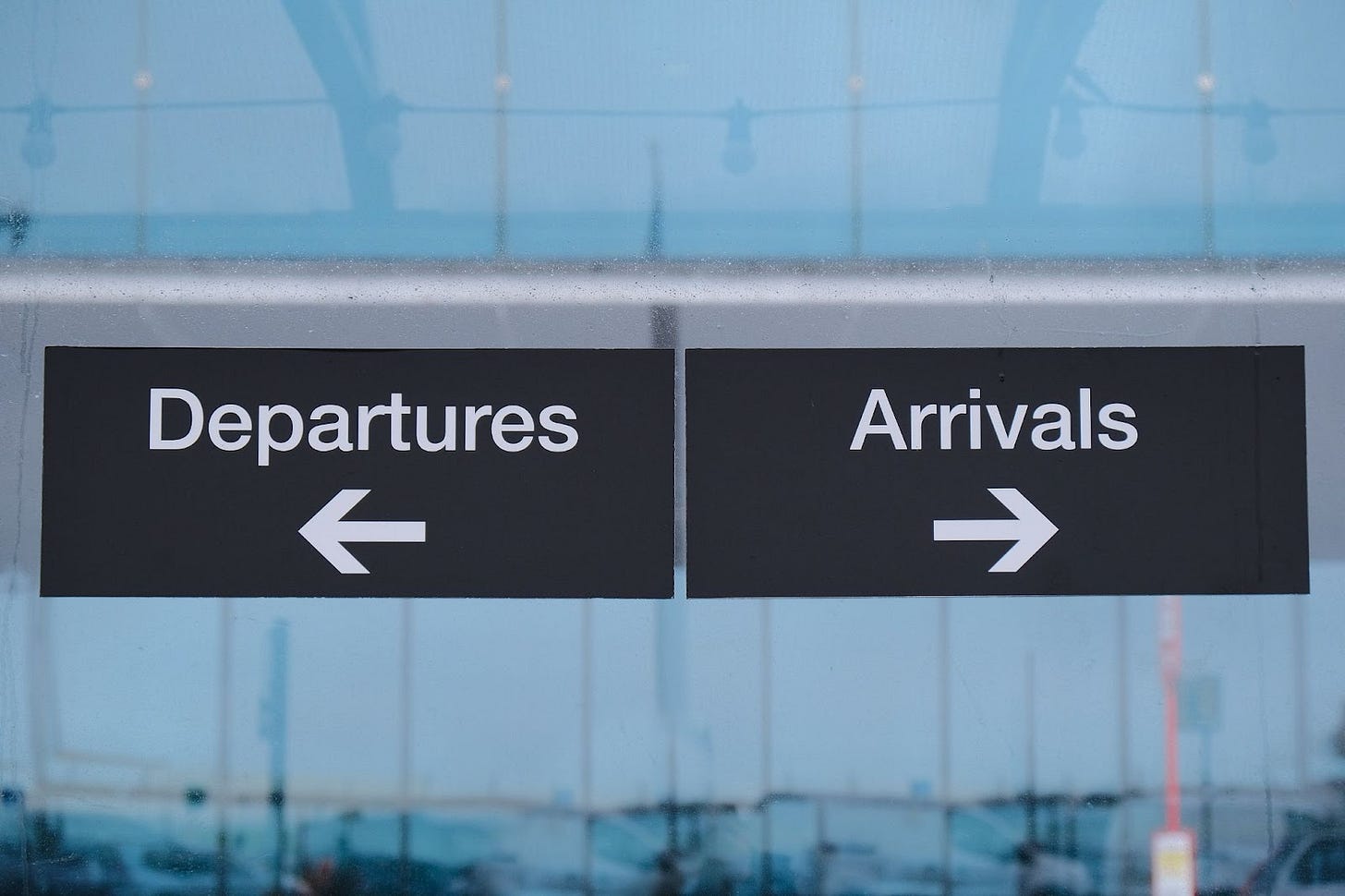As I approach 40, I’m embarking on a year-long project to reflect on the lessons I’ve learned in four decades of life. This is lesson #3. You can read the full series here.
I’m a firm believer in practicing what you preach. I’ve left jobs because upper-level management wasn’t living by the values it espoused. I’ve had minor existential crises when the things I cared about weren’t lining up with the choices I was making. And I’ve reconsidered various relationships whenever I noticed that the things people said didn’t correlate with their actions.
The nice thing about compiling a series of lessons is that it gives me a chance to put them into practice before putting those ideas to paper. I did just that with today’s lesson, as I recently returned home after four days away from my family.
It’s a lesson I’ve learned many times: The return home is rarely smooth.
Returning to your childhood home over the holidays or after a semester away at college can be fraught, with emotional landmines abound. Returning to your own home after a relaxing vacation or energizing work trip might be a bummer. For young children — when everything is new, and time seems to pass extra slowly — returning home after a long day at school is its own significant transition. A few weeks ago, a friend of mine returned home after a few days at the hospital; that, too, she told me, was a challenge.
The internet is full of people looking for explanations as to why returning home can be so difficult. There are Quora and Reddit queries from avid travelers wondering if they’re the only ones who feel a bit depressed after returning from a long vacation. Advice columnists offer tips on traveling home for the holidays and reassurance that it can be complicated. And, for the parents wondering about the disconnect between the easygoing child who happily plays and learns at school and the strong-willed, refuses-to-listen kid at home, there are countless articles, podcast episodes, and desperate Facebook posts about “restraint collapse.”
After-school restraint collapse, as coined by counselor and parenting educator Andrea Lowen Nair, can manifest itself through meltdowns, tantrums, or other extreme behaviors. It occurs, Nair says, because children manage their emotions all day at school and release their true feelings — all the frustration, wants, sadness, and other things they may have bottled up — once they’re back home, in a safe place.
We all experience a version of this from time to time, no matter our age. Personally, I know that I bottle up a lot when I travel by plane. I try to move quickly through the terminals, not take up too much room in my seat, and avoid being visibly upset when another traveler is overly loud or rude. I will myself to stay cool and calm when the security line is extra slow or my flight is extra turbulent. I smile when I make eye contact with other passengers, but otherwise try to avoid eye contact. Same for small talk. I make myself small — in every way possible.
It’s no wonder that, when I return home and can be myself, I’m no longer as meek or easygoing. I’m more vocal about the things that annoy or exhaust me, less concerned about hiding my true feelings. I become the adult version of that exhausted toddler who can now let it all go.
And although loosening my grip on the restraint I demonstrated while traveling can be liberating, it can also make for a pretty bumpy landing.
Not long after I returned home from last week’s work trip, Billy and I debated the right wording for today’s lesson. I planned to share something like “returning home is always difficult;” Billy said that phrasing was overly negative and not universally true. He was right.
Returning home is rarely smooth — but it’s not always bad. Returning home can be so very sweet. It can be a giant relief. It can be marvelous. When my family picked me up at the airport on Friday, my daughter proudly handed me some colorful paintings she’d made. “Dat’s for you, mama!” she called out from her carseat. My heart swelled. How wonderful to be home!
But returning home, like everything else in life, hardly ever goes exactly like you imagine it. There is always a period of recalibration, of settling down, of getting back in sync with your surroundings. There is almost always a moment when things feel a bit off.
No matter how far you may travel or how much you may learn or experience while you’re away, home is still there — a reminder of the person you are and, to an extent, always will be. This can be comforting. This can also be frustrating.
As long-distance hiker Cindy Ross wrote, “Returning home is the most difficult part [...]. You have grown outside the puzzle and your piece no longer fits.”
At its face value, this lesson may not seem that helpful: Returning home is rarely smooth. Sure. But what do you do with that information?
Here are a few tips I’ve accumulated over the years, ones I put into practice this past week:
Accept it. Returning home is rarely smooth. Knowing this, accepting this truth, often makes the return home go more smoothly! When things inevitably go sideways, this phrase helps me to remember that the rockiness is temporary — and part of the territory.
Anticipate it. Yes, the return home might be bumpy, but there are things you can do ahead of time to make it a bit easier. I’m a big fan of tidying up before a trip, so that I can return to a clean home. Washing your sheets and making your bed? Game-changer. It’s also a good idea to have a plan in place for what you’ll eat when you return, whether that’s takeout or something prepared in the fridge. Returning home on an empty stomach is a disaster waiting to happen.
Communicate it. If you live with other people, tell them how you are feeling. You might text them from the tarmac with something like, “I’m excited to see you, but also exhausted. Can we have a quiet night tonight?” If you live alone, reach out to a friend: “I have so many travel stories I’m eager to share! Can we make plans to meet up soon?” And if you have a lot of thoughts and feelings from your experience away — whether it was something you did solo or with others — consider writing them down. Journaling can be a wonderful tool.
Challenge it. Does the return home have to be difficult? I thought about this lesson on the plane ride to and from Washington, D.C. last week, and wondered if I could tell a new story. The return home is rarely smooth, yes, but that doesn’t mean it’s bad. Reframing the narrative is helpful for me.
Life is full of departures and arrivals, hellos and goodbyes — it’s full of transitions, and transitions can often be tough. Although we can’t anticipate everything that will happen during those transitions or even how we’ll react to them in the moment, we can count on and take solace in the fact that home is waiting for us — whether it’s a literal residence, a person we trust, or some other environment where we feel safe. That place exists, where we can be our perfectly imperfect selves.
My flight home from D.C. was, in fact, a bumpy one. We hit turbulence from the start, and the crew opted to skip the beverage service entirely, because moving carts and drinks around would be far too challenging. We experienced stomach-dropping dips in the air and unnerving gasps from fellow passengers. Through it all, we did our best to stay calm.
It wasn’t the return flight I would have chosen, but it’s the one I got.
And when we finally touched the ground? It felt wonderful.
xoxo KHG






Another fantastic and timely lesson. We just returned from 10 days away with our toddler (which was harder than I even anticipated, even though she is awesome). We deliberately returned on Sunday instead of Memorial Day, to avoid the worst travel crush and to give ourselves a day to transition. But I realized today that I need a *second* transition day, once toddler is back at school. I'm doing laundry, making meals, running down my list of annoying errands. As a self-employed consultant, I was anxious to get back to work -- but this day (well, school day) of transition feels like a gift.
Lovely, Katie. I often think of the return home as “re-entry.” As if we’re astronauts.